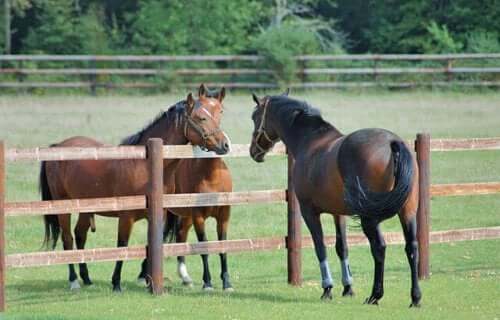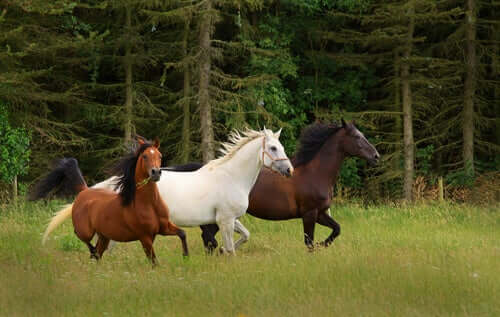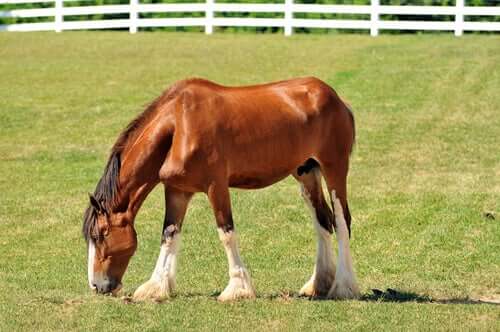Horse Care: Advice and Useful Tips

Taking care of a horse requires a good part of your time and dedication. However, it’s a rewarding activity. A horse is a noble animal who responds to interaction by being sensitive to their surroundings. This is why up next we’ll discuss which are the best tips and advice to take into account for this matter. The idea is to make horse care a simple task!
Basic information about horse care
Horses, on average, can live up to 25 or 30 years. Thus, taking care of them requires commitment and responsibility. Providing an ideal space, food, hygiene, and exercise, are the main factors to consider when raising them.
If you’re just getting started, you could make use of the following guidelines. Ideally, you could start with a mare or a spay horse that’s used to being around people. The animal’s trust is gained with patience and tender handling.
Horses can really feel and appreciate it when they’re being respected and will offer the same back. As a result, any violent or sudden movements should be avoided. A confident but gentle pat on the neck every now and then can help them to feel at ease.

The ideal space
In order for horses to feel at ease, pasture the size of a hectare is ideal for them to move around and exercise. In addition, the area should be carefully fenced and barbed wire shouldn’t be used at all.
Special care must be taken to ensure that toxic plant species don’t grow anywhere near them. Some examples of toxic plants are poison Hemlock, water Hemlock, Bracken ferns, Horsetail plant, Tansy ragwort, and Locoweed. Horses are herbivorous animals that usually graze several times a day in small quantities. Therefore, it’s vital to pay close attention to what’s growing in the area they’ll be placed in.
A good element to consider before deciding to raise a horse is the space the area they’ll live in. They must have a shelter that protects them from harsh weather and a proper space to sleep in. It’s important to keep this area clean, remove their daily feces and provide a place that serves as a bed.
For the purpose of resting, using any of the following materials is ideal:
- Straw – this is cheaper, but has some fungal elements that can make the animal sick
- Wood shavings – these are more hygienic, but somewhat more expensive.
- A good option to consider is hemp.
Horse feeding details
Being a pasture animal, horses ingest small amounts of grass several times a day. Ideal food options consist of hay bales, alfalfa or a mix between both. It’s a good idea to enrich their food with industrial products that provide the necessary vitamins.
A horse weighing 900 pounds (average size), usually ingests between 20 to 22 pounds of food daily. Ideally, however, a veterinarian should be consulted first. He or she will indicate the appropriate food according to their weight and the amount of exercise they do.
An important factor that shouldn’t be missed is making sure they don’t lack fresh and clean water. Their water bucket should be filled at least twice a day. Keep in mind that horses drink between 4 and 8 gallons of water daily.
Hygiene and hoof care
In order to raise a horse properly, keeping them clean is essential as well as having a vet check their health often.
It’s also advisable to brush their hair regularly, observing closely for any signs of cuts, wounds, ticks or possible diseases. Showers should take place on warm days and with a proper shampoo. In addition, combing their hair using a wide-tooth comb and avoiding brushing or combing too hard is also a good tip.
You should make sure to clean their hoofs and rid them of any stuck stones or dirt inside the grooves. Moreover, it’s important to check if the hoofs are loose or show cracks.

Good exercise
The amount of exercise a horse needs will depend on their age and health. With proper control, we recommend at least one hour of exercise four times a week for horses.
Physical activity is very beneficial for every horse’s health:
- It keeps the stallion’s muscles strong
- It reinforces the bond of trust between the horse and the owner
- It’s a moment of the day when they can relax, thus avoiding anxiety, nervousness, and stress
Last but not least, some useful tips for raising horses
- Cleaning the manure and urine shed regularly. This waste is harmful to their hoofs and to the animal’s health in general.
- Making periodic visits to the veterinarian to check, vaccinate and deworm the horse.
- Having a horse veterinarian check their teeth at least once a year.
- Cutting their hoofs and checking their horseshoes.
- Never approach a horse from behind or shout when close to them. This can frighten them and they could react by kicking.
- Try to spend some time with the horse aside from the riding time. This strengthens trust and helps build the bond.
We hope you found this article about horse care useful and will have a wonderful time with these majestic animals!
Featured image source: Viault
